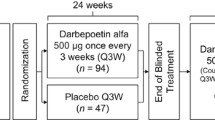Abstract
AMG 114 is a novel, hyperglycosylated erythropoiesis-stimulating agent. In preclinical studies, AMG 114 demonstrated increased potency and longer half-life than darbepoetin alfa and epoetin alfa. This phase I/II, randomised, double-blind, placebo-controlled, dose-escalation study evaluated safety, pharmacokinetics, and efficacy of AMG 114 in patients with non-myeloid malignancies and chemotherapy-induced anaemia. Patients were randomised (1:5) to receive subcutaneous placebo or AMG 114 Q3W for 6 weeks in 3 dose cohorts of 15 μg (cohort A1), 50 μg (cohort A2), or 200 μg (cohort A3). Safety endpoints included incidence of adverse events and dose-limiting toxicities (DLTs). The PK profile of AMG 114 was evaluated. Efficacy was assessed by change in haemoglobin from baseline to end of treatment. Forty-eight patients enrolled: 8 received placebo, 40 received AMG 114. No DLTs were observed; adverse events were consistent with underlying malignancies. The PK profile was dose-proportional over the dose range tested; terminal half-life of AMG 114 was approximately 130 h. Mean change (range) in haemoglobin from baseline in AMG 114-treated patients was −0.16 (−1.8 to 1.3), 0.21 (−1.5 to 3.4), and 0.76 (−1.0 to 2.9) g/dl in cohorts A1, A2, and A3, respectively. AMG 114 appeared to be well tolerated, but the study was halted, in part because of modest efficacy.



Similar content being viewed by others
References
Egrie JC, et al. Characterization and biological effects of recombinant human erythropoietin. Immunobiology. 1986;172:213–24.
Egrie JC, Dwyer E, Browne JK, Hitz A, Lykos MA. Darbepoetin alfa has a longer circulating half-life and greater in vivo potency than recombinant human erythropoietin. Exp Hematol. 2003;31:290–9.
Egrie JC, Browne JK. Development and characterization of novel erythropoiesis stimulating protein (NESP). Br J Cancer. 2001;84(Suppl 1):3–10.
Ludwig H, et al. Pooled analysis of individual patient-level data from all randomized, double-blind, placebo-controlled trials of darbepoetin alfa in the treatment of patients with chemotherapy-induced anemia. J Clin Oncol. 2009;27:2838–47.
Bohlius J, et al. Recombinant human erythropoiesis-stimulating agents and mortality in patients with cancer: a meta-analysis of randomised trials. Lancet. 2009;373:1532–42.
Aranesp® (darbepoetin alfa) prescribing information, Thousand Oaks, Calif.: Amgen Inc.; 2010.
Procrit® (epoetin alfa) prescribing information, Bridgewater, New Jersey: Ortho Biotech Products LP; 2010.
European Medicines Agency. Questions and answers on epoetins and the risk of tumour growth and blood clots in the veins, 26 June 2008. Available at http://www.ema.europa.eu/docs/en_GB/document_library/Medicine_QA/2009/11/WC500015145.pdf. Accessed 16 Sep 2010.
Beveridge RA, et al. Impact of long-acting growth factors on practice dynamics and patient satisfaction. Pharmacotherapy. 2003;23:101S–9S.
Houts AC, Loh GA, Fortner BV, Kallich JD. Patient and caregiver time burden associated with anaemia treatment in different patient populations. Support Care Cancer. 2006;14:1195–204.
Schwartzberg L, et al. A multicenter retrospective cohort study of practice patterns and clinical outcomes of the use of darbepoetin alfa and epoetin alfa for chemotherapy-induced anemia. Clin Ther. 2003;25:2781–96.
Herrington JD, et al. Utilization of darbepoetin alfa and epoetin alfa for chemotherapy-induced anemia. Am J Health Syst Pharm. 2005;62:54–62.
Morrison VA, et al. Observational study of the prevalence of febrile neutropenia in patients who received filgrastim or pegfilgrastim associated with 3–4 weeks chemotherapy regimens in community oncology practices. J Manag Care Pharm. 2007;13:337–48.
Glaspy J, et al. Effects of chemotherapy on endogenous erythropoietin levels and the pharmacokinetics and erythropoietic response of darbepoetin alfa: a randomised clinical trial of synchronous versus asynchronous dosing of darbepoetin alfa. Eur J Cancer. 2005;41:1140–9.
Elliott S, et al. Evaluation of hyperglycosylated erythropoiesis stimulating proteins developed using glycoengineering. Proc Amer Assoc Cancer Res. 2006;47 (Abstract 2176).
Elliott S, et al. Control of rHuEPO biological activity: the role of carbohydrate. Exp Hematol. 2004;32:1146–55.
Canon JL, et al. Randomized, double-blind, active-controlled trial of every-3-week darbepoetin alfa for the treatment of chemotherapy-induced anemia. J Natl Cancer Inst. 2006;98:273–84.
Vansteenkiste J, et al. Double-blind, placebo-controlled, randomized phase III trial of darbepoetin alfa in lung cancer patients receiving chemotherapy. J Natl Cancer Inst. 2002;94:1211–20.
Acknowledgments
The authors thank the patients and their families for participation in the study and the clinical study staff at all participating institutions. We also wish to thank Julia R. Gage, PhD, for writing assistance on behalf of Amgen Inc. The Source of support is Amgen Inc.
Conflict of interest
Richard de Boer, Gabor Renczes, Jana Prausova, Norbert Marschner, and Michael Hedenus have no conflicts to disclose. Michael Clemens received financial support from Amgen for documentation of the study data. Dusan Kotasek has received honoraria from Roche Australia and research funding from Amgen, Roche, Cougar Pharmaceuticals, Sanofi-Aventis, Wyeth, and Pfizer. Sameer Doshi and Lisa Hendricks are employees and shareholders of Amgen Inc. Anders C. Österborg has received honoraria for lectures at symposia sponsored by Amgen.
Author information
Authors and Affiliations
Corresponding author
Rights and permissions
About this article
Cite this article
de Boer, R., Clemens, M., Renczes, G. et al. Phase I/II randomised study of a novel erythropoiesis-stimulating agent (AMG 114) for the treatment of anaemia with concomitant chemotherapy in patients with non-myeloid malignancies. Med Oncol 28, 1210–1217 (2011). https://doi.org/10.1007/s12032-010-9725-7
Received:
Accepted:
Published:
Issue Date:
DOI: https://doi.org/10.1007/s12032-010-9725-7




